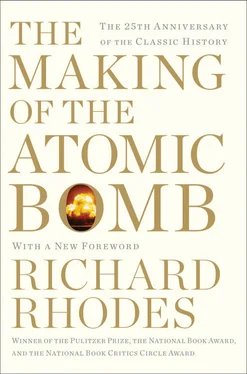Those alternative pathways did exist. I did find them, as others had before me, hidden in plain sight. By placing them at the center of this book I tried to reilluminate them. The Making of the Atomic Bomb has become the standard prehistory and history of the Manhattan Project. It has been translated into a dozen languages and published around the world. I’ve heard from enough people in government, in the United States and abroad, to know that it has been widely read in pentagons and white houses. In that way it has contributed to a general understanding of the paradox of nuclear weapons. I don’t mean the paradox of deterrence, which partakes of the fetish object delusion that Harrington de Santana delineates. I mean the paradox which the great Danish physicist Niels Bohr first articulated: that, though nuclear weapons are the property of individual nation-states, which claim the right to hold and to use them in defense of national sovereignty, in their indiscriminate destructiveness they are a common danger to all, like an epidemic disease, and like an epidemic disease they transcend national borders, disputes, and ideologies.
I included so much Manhattan Project prehistory in this book—the history of nuclear physics from the discovery of radioactivity at the end of the nineteenth century up to the discovery of nuclear fission in Nazi Germany in late 1938—partly because I believed I had to understand the physics, as well as a layman can, if I hoped to understand what was revolutionary about the bombs, and assumed readers would wish to do so as well. I had one lecture course in physics in college, no more, but I learned there that nuclear physics is almost entirely an experimental science. Which means that the discoveries that led to the bombs were the consequence of the physical manipulation of objects in the laboratory: this metal box, fitted with a radiation source, a sample inserted, measured using this instrument, with this result, and so on. Once I’d mastered the jargon, it was possible to read through the classic papers in the field, visualize the experiments, and understand the discoveries, at least where their application to making bombs was concerned.
Later, I realized that reviewing the history of nuclear physics served another purpose as well: It gave the lie to the naive belief that the physicists could have come together when nuclear fission was discovered (in Nazi Germany!) and agreed to keep the discovery a secret, thereby sparing humankind the nuclear burden. No. Given the development of nuclear physics up to 1938, development that physicists throughout the world pursued in all innocence of any intention of finding the engine of a new weapon of mass destruction—only one of them, the remarkable Hungarian physicist Leo Szilard, took that possibility seriously—the discovery of nuclear fission was inevitable. To stop it, you would have had to stop physics. If German scientists hadn’t made the discovery when they did, British, French, American, Russian, Italian, or Danish scientists would have done so, almost certainly within days or weeks. They were all working at the same cutting edge, trying to understand the strange results of a simple experiment bombarding uranium with neutrons.
Here was no Faustian bargain, as movie directors and other naifs still find it intellectually challenging to imagine. Here was no evil machinery that the noble scientists might have hidden from the politicians and the generals. To the contrary, here was a new insight into how the world works, an energetic reaction, older than the earth, that science had finally devised the instruments and arrangements to coax forth. “Make it seem inevitable,” Louis Pasteur used to advise his students when they prepared to write up their discoveries. But it was. To wish that it might have been ignored or suppressed is barbarous. “Knowledge,” Niels Bohr once noted, “is itself the basis for civilization.” You cannot have the one without the other; the one depends upon the other. Nor can you have only benevolent knowledge; the scientific method doesn’t filter for benevolence. Knowledge has consequences, not always intended, not always comfortable, not always welcome. The earth revolves around the sun, not the sun around the earth. “It is a profound and necessary truth,” Robert Oppenheimer would say, “that the deep things in science are not found because they are useful; they are found because it was possible to find them.”
Those first atomic bombs, made by hand on a mesa in New Mexico, fell onto a stunned pre-nuclear world. Afterward, when the Soviet Union exploded a copy of the Fat Man plutonium bomb built from plans supplied by Klaus Fuchs and Ted Hall and then went on to develop a comprehensive arsenal of its own, matching the American arsenal; when the hydrogen bomb increased the already devastating destructiveness of nuclear weapons by several orders of magnitude; when the British, the French, the Chinese, the Israelis, and other nations acquired nuclear weapons, the strange new nuclear world matured. Bohr proposed once that the goal of science is not universal truth. Rather, he argued, the modest but relentless goal of science is “the gradual removal of prejudices.” The discovery that the earth revolves around the sun has gradually removed the prejudice that the earth is the center of the universe. The discovery of microbes is gradually removing the prejudice that disease is a punishment from God. The discovery of evolution is gradually removing the prejudice that Homo sapiens is a separate and special creation.
The closing days of the Second World War marked a similar turning point in human history, the point of entry into a new era when humankind for the first time acquired the means of its own destruction. The discovery of how to release nuclear energy, and its application to build weapons of mass destruction, has gradually removed the prejudice on which total war is based: the insupportable conviction that there is a limited amount of energy available in the world to concentrate into explosives, that it is possible to accumulate more of such energy than one’s enemies and thereby militarily to prevail. So cheap, so portable, so holocaustal did nuclear weapons eventually become that even nation-states as belligerent as the Soviet Union and the United States preferred to sacrifice a portion of their national sovereignty—preferred to forego the power to make total war—rather than be destroyed in their fury. Lesser wars continue, and will continue until the world community is sufficiently impressed with their destructive futility to forge new instruments of protection and new forms of citizenship. But world war at least has been revealed to be historical, not universal, a manifestation of destructive technologies of limited scale. In the long history of human slaughter that is no small achievement.
In the middle years of my life I lived on four acres of land in Connecticut, a meadow completely enclosed within a forested wildlife preserve. It teemed with creatures: deer, squirrels, raccoons, a woodchuck family, turkeys, songbirds, crows, a Cooper’s hawk, even a pair of coyotes. Except for the hawk, every one of those animals constantly and fearfully watched over its shoulder lest it be caught, torn, and eaten alive. From the animals’ point of view, my edenic four acres were a war zone. Only very rarely does an animal living under natural conditions in the wild die of old age.
Until recently, the human world was not much different. Since we are predators, at the top of the food chain, our worst natural enemies historically have been microbes. Natural violence, in the form of epidemic disease, took a large and continuous toll of human life, such that very few human beings lived out their natural lifespans. By contrast, man-made death—death, that is, by war and war’s attendant privations—persisted at a low and relatively constant level throughout human history, hardly distinguishable in the noise of the natural toll.
Читать дальше












